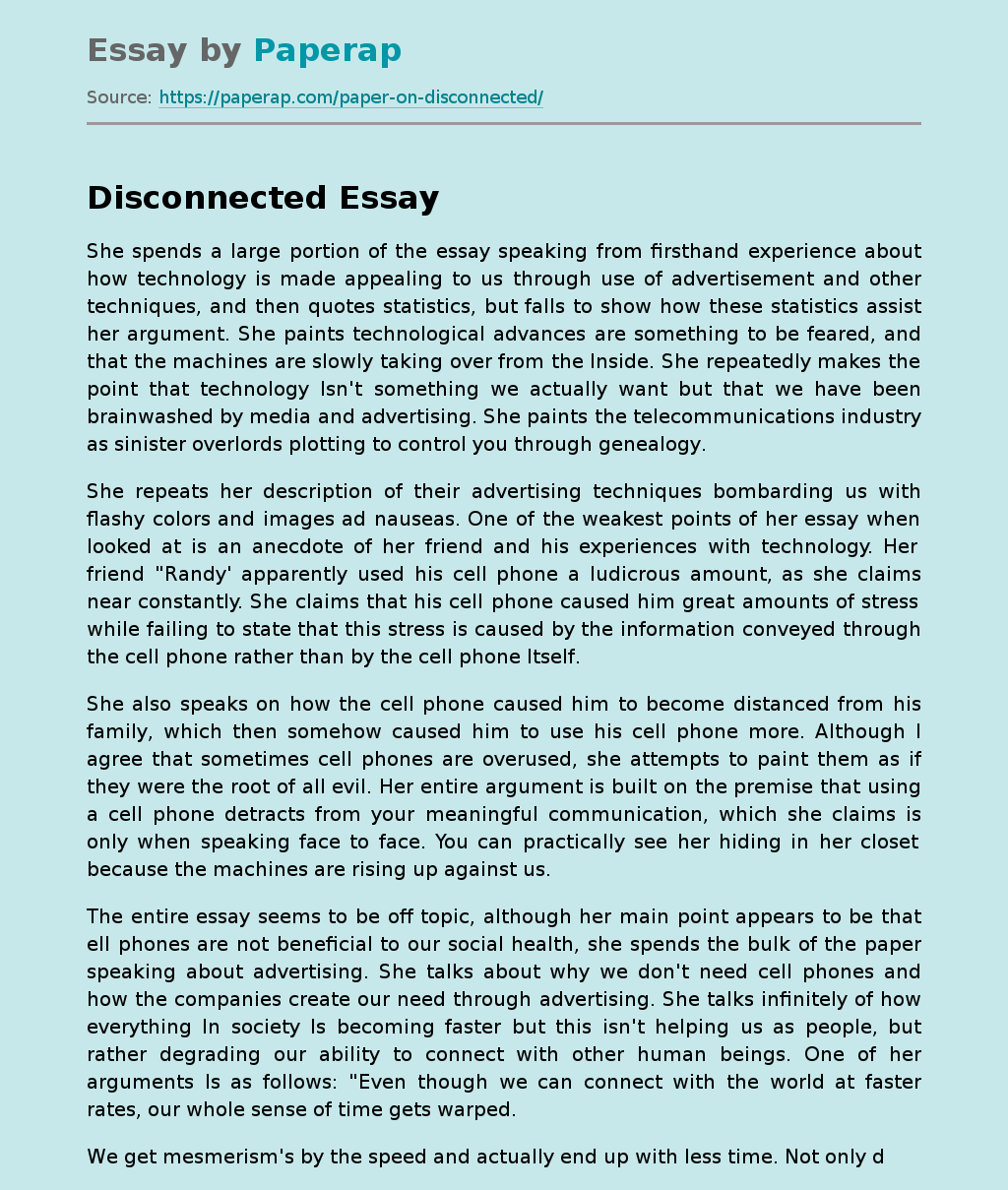Technology Advertising and Appeal
She spends a large portion of the essay speaking from firsthand experience about how technology is made appealing to us through use of advertisement and other techniques, and then quotes statistics, but falls to show how these statistics assist her argument. She paints technological advances are something to be feared, and that the machines are slowly taking over from the Inside. She repeatedly makes the point that technology Isn’t something we actually want but that we have been brainwashed by media and advertising.
She paints the telecommunications industry as sinister overlords plotting to control you through genealogy.
She repeats her description of their advertising techniques bombarding us with flashy colors and images ad nauseas. One of the weakest points of her essay when looked at is an anecdote of her friend and his experiences with technology. Her friend “Randy’ apparently used his cell phone a ludicrous amount, as she claims near constantly. She claims that his cell phone caused him great amounts of stress while failing to state that this stress is caused by the information conveyed through the cell phone rather than by the cell phone Itself.
She also speaks on how the cell phone caused him to become distanced from his family, which then somehow caused him to use his cell phone more. Although I agree that sometimes cell phones are overused, she attempts to paint them as if they were the root of all evil. Her entire argument is built on the premise that using a cell phone detracts from your meaningful communication, which she claims is only when speaking face to face.
You can practically see her hiding in her closet because the machines are rising up against us.
The entire essay seems to be off topic, although her main point appears to be that ell phones are not beneficial to our social health, she spends the bulk of the paper speaking about advertising. She talks about why we don’t need cell phones and how the companies create our need through advertising. She talks infinitely of how everything In society Is becoming faster but this isn’t helping us as people, but rather degrading our ability to connect with other human beings. One of her arguments Is as follows: “Even though we can connect with the world at faster rates, our whole sense of time gets warped.
We get mesmerism’s by the speed and actually end up with less time. Not only does this make no sense whomsoever, seen also Tall’s to support It at all, Ana Immediately continues on to TA once again about the infamous marketing strategies used by the big evil telecommunication companies. Perhaps her best citation in the entire paper is her quote from Arson Well’s “War of the Worlds. ” When your best support for a factual claim is a science fiction author’s radio broadcast from 60 years ago, it’s probably time to abandon your argument.
Even after this quotation, she paraphrases it in a way that distorts its meaning and in al reality has nothing to do with what Arson Wells was writing about. The argument that is truly the lowest point in the essay is cut directly out of the story of The Matrix. “Technologically advanced communication devices are the guiding force leading us into our own virtual worlds. ” She uses this to assert that we are relying so heavily on our technology that eventually we will shun human contact altogether. She even expresses fear over the prospect of more technology that aids in communication.
She does make the concession that technology can be beneficial, but the entire one of the essay seems to be that it was best about 10 years ago when the technology was available but before it was advanced enough to be a convenient part of modern day lives. One of the central points of her argument, that humans need physical contact with other humans isn’t even proven to be a fact. Overall, the essay is entirely too long for what it’s actually trying to get across. The primary argument is poorly supported and much of the support is redundant and not factual. In the end, Lynda Smith fails to prove that technology is doing anything to us at all.
Technology Advertising and Appeal. (2017, Nov 09). Retrieved from https://paperap.com/paper-on-disconnected/

